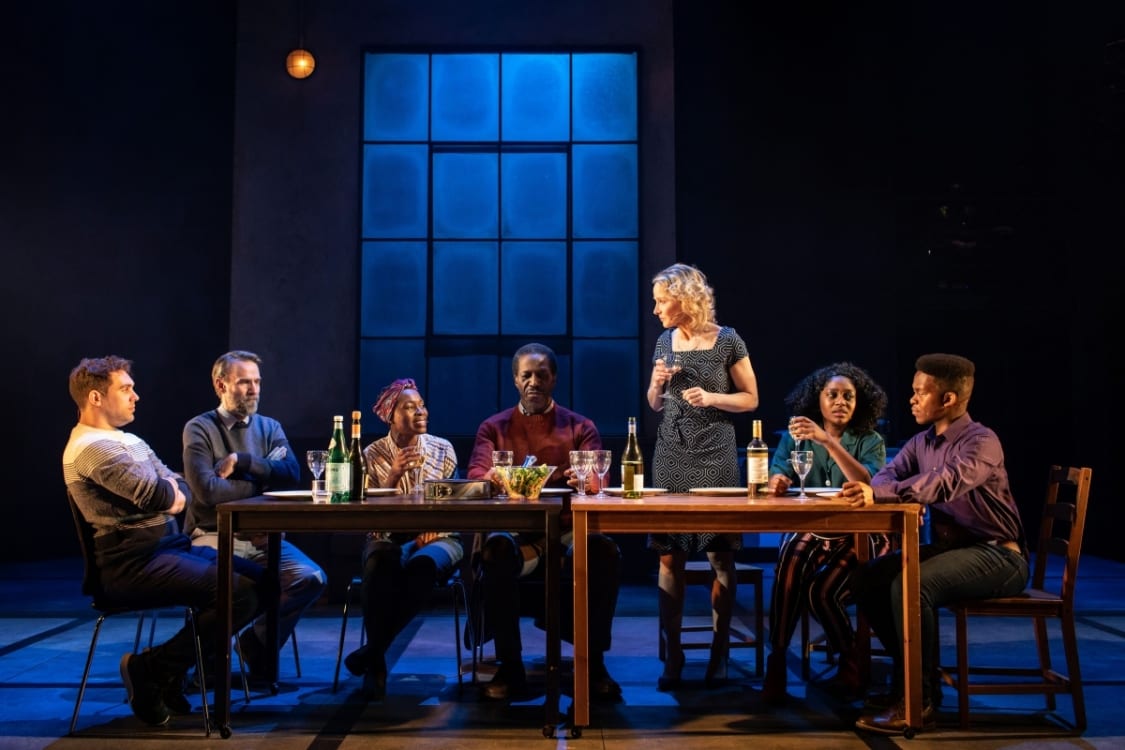Kele Okereke is best known as the frontman and creative heart of the English rock band Bloc Party – not someone conventionally associated with the London musical theatre scene. But these are unconventional times, and his new project for the Lyric Hammersmith, although flawed, offers an original and entertaining take on the genre.
Written alongside Matt Jones, Leave to Remain tells the story of a couple rushing into marriage after a visa issue. The concept is familiar, even a bit played, but Jones and Okereke find new ground to tread, using a gay couple to explore whether the newly legalised institution of gay marriage could challenge or simply complicate the alienation they face in a persistently heteronormative society.
For those without a taste for cheesy musicals, Leave to Remain offers something a bit more palatable. The songs are well-integrated with the dialogue and the musical arrangement feels coherent and unpretentious, drawing on contemporary rock, West African high life and electronic dance to produce a musical theatre experience that feels genuinely original.
Tyrone Huntley and Billy Cullum, playing Obi and Alex respectively, give a warm and authentic portrayal of young, gay romance. Obi is a Londoner whose parents immigrated from Nigeria before he was born, while Alex moved from America for work.
The opening scene comprises a medley of song, dance and dialogue in which Obi and Alex flirt, exchange numbers and get to know each other. While an effective pretext, this scene feels a bit bloated – a common flaw among the play’s musical sections. Director Robby Graham choreographs some stunning pieces of physical story-telling but could do with slimming them down. At one hour and fifty minutes, no interval, Leave to Remain is a hefty piece of theatre and can’t afford the excess.
 Despite the obvious connotations, this isn’t a play about Brexit. The B-word is mentioned only briefly, providing the reason for Alex’s visa dilemma. More interestingly, Leave to Remain explores the stories, themes and conflicts that are packed into Brexit, but exist beyond and above its influence. Jones and Okereke play with the expectation by making Alex – the white man with an Anglophonic name – the foreigner at risk of deportation, while Obi’s Britishness is prized and undisputed.
Despite the obvious connotations, this isn’t a play about Brexit. The B-word is mentioned only briefly, providing the reason for Alex’s visa dilemma. More interestingly, Leave to Remain explores the stories, themes and conflicts that are packed into Brexit, but exist beyond and above its influence. Jones and Okereke play with the expectation by making Alex – the white man with an Anglophonic name – the foreigner at risk of deportation, while Obi’s Britishness is prized and undisputed.
After learning of Alex’s visa issue, Obi quickly agrees to marry him, although he appears uncomfortable with the idea. Obi’s reticence is explained through a skilfully staged flashback that shows him being kicked out the family home for kissing a boy. The prospect of marriage brings sexuality and family back into conflict, and he feels grudgingly obliged to reconnect. Alex’s parents are more accepting, but the family dynamic is dogged by emotional baggage. As the two families come together, the notion of marriage as a public expression of unity and consent begins to unravel.
The play loses momentum towards the end and risks falling into cliché. Alex and Obi’s marriage is a kind of deus ex machina, circumventing some of the sexual and social dilemmas that complicate their earlier relationship. Nonetheless, Leave to Remain navigates a tricky subject with sensitivity while producing an enjoyable piece of theatre. For Okereke’s first venture as a playwright, there is much to be admired.
Byline: Bloc Party frontman Kele Okereke’s debut musical is a heart-warming gay love story that struggles to find its feet

